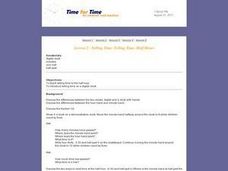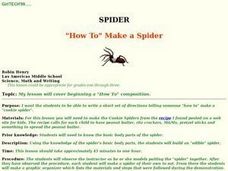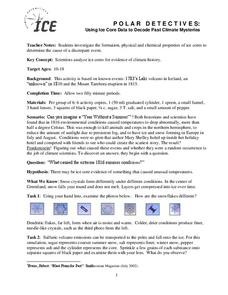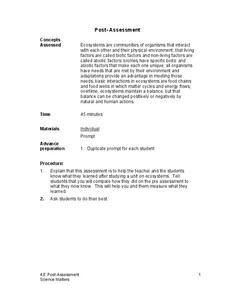Time for Time
Telling Time: Telling Time: Half Hours
The whole class discusses the differences between the two clocks: digital and a clock with hands. They discuss the differences between the hour hand and minute hand. Students are taught telling time to the half hour. They are introduced...
National Wildlife Federation
Citizen Science to the Rescue!
You don't have to be a scientist or even out of high school to contribute to scientific research. In the 12th lesson in the series of 21, scholars use this opportunity to add to the growing body of scientific knowledge and consider the...
Curated OER
Spider "How To" Make a Spider
Young chefs follow the set-by-step instructions of a recipe and use their prior knowledge of the body parts of a spider to make edible spider cookies. After completing a pre-writing graphic organizer they then write a "how to"...
Curated OER
Descending to the Challenge: Developing Documentaries About the Deep Ocean
The video clip that comprises the warm up is not available, but the related article from The New York Times and the movie trailer for Aliens of the Deep are, leaving enough material to make this a fascinating lesson on deep-sea...
Curated OER
Sun and Shadows
Why do shadows look different in the summer than in the winter? What causes day and night? How can a sundial be used to tell time? Answer these questions and more through two engaging lessons about light and shadows. Fourth and fifth...
DiscoverE
Hold Your Water
Let's hope there are no leaks. Pupils work together in groups to build a device that will keep as much water as possible in a cup. After being dropped from a height of seven feet! Time to haul out the ladder.
DiscoverE
Spaceship to Mars
Feel like a rocket scientist for the day. Using only paper and tape, scholars create a framework for a spaceship to Mars. Each sheet of paper costs $10 million and each piece of tape costs $100,000. Make sure you stay within budget!
Curated OER
Can Scientists Discover a Limit to Discovery?
Is there anything left to discover? Evaluate opposing sides of the debate regarding whether or not there is a future for scientific discovery. Middle and high schoolers assess quotations from the articles included to evaluate claims and...
Polar Trec
Polar Detectives: Using Ice Core Data to Decode Past Climate Mysteries
How does examining an ice core tell us about weather? Learners set up and explore fake ice cores made of sugar, salt, and ash to represent historical snowfall and volcanic eruptions. From their setups, scholars determine what caused the...
Curated OER
To The Clock of Eras
Third graders investigate the events of geological time using a chart called a "Clock of Eras". In this geological events lesson plan, 3rd graders compare a standard clock to a geological clock. In addition, students consider periods...
Curated OER
Life Through Time: The Heart of the Phanerozoic
Students gain a deeper understanding of geological time and the evolution of life on Earth. They use iMovie to tell a complex story of a discrete time period with narration and images.
NASA
Touchdown
Individuals design and build a set of shock absorbers to protect their astronauts when they land. Using a limited amount of supplies, pupils build a system that will keep two large marshmallows from flying out of a cup when it lands...
DiscoverE
Let's Make an Elastic Puppet
Create bending joints—but don't break! The activity shows how to make a puppet using straws and fishing line. Pupils create cuts to make joints that rely on the elasticity of the straw to bend and return to their original shapes.
Science Matters
Post-Assessment
Twenty questions make up an assessment designed to test super scientists' knowledge of ecosystems. Scholars answer multiple-choice and short-answer questions about organisms, food chains, energy flow, and more.
Science Friday
Cooking with Chemistry
Use class time to perfect your hollandaise sauce with a chemistry lesson. It includes two activities to teach about immiscible liquids, emulsifiers, and creating a stable homogenous mixture. Young scientists first mix...
Chicago Botanic Garden
Historical Climate Cycles
What better way to make predictions about future weather and climate patterns than with actual climate data from the past? Young climatologists analyze data from 400,000 to 10,000 years ago to determine if climate has changed over...
Curated OER
Using a Graphic Organizer to Research a Question
Is Pluto still a planet? Using this popular question, kids are introduced to graphic organizers as a writing tool. As a class, they watch a demonstration on how to use them and work together with a partner to research whether Pluto is a...
Curated OER
Changing Planet: Black Carbon - a Dusty Situation
Introduce your young meteorologists to black carbon produced by the burning of fossil fuels by showing the video, "Changing Planet: Black Carbon." Viewers discover that deposition of this carbon on polar ice impacts the absorption of...
Curated OER
Make a Sundial
Students explore space science by conducting a sun experiment in class. In this time telling lesson, students discuss how the sun sits in our sky at exact times each day and how astronomy is based on our perspective of the solar system....
Chicago Botanic Garden
Reflecting on What I Learned About Climate Change
After three eye-opening lessons about our environment, scholars revisit a 10-question survey, reflect on their new-found knowledge, and take action by writing to a representative or creating a public service announcement about...
Polar Trec
Talk Story: A Native Way of Knowing
The steps of the scientific method examine a problem, make a prediction, and attempt to solve the problem—similar to the path most stories take. In the activity, individuals see how stories can explain natural events similar to the way...
DiscoverE
Air Train
Train your pupils to be master engineers. Young learners design a train that travels along a fishing line. The train needs to safely carry pennies as passengers without falling out.
PHET
Radiation Hazards in Space
Young scientists race from Earth to Mars and back, trying to complete mission objectives while avoiding radiation in this game for 2-4 players. To identify the winner, players must graph their mission points and radiation points at the...
Curated OER
Whale Song Acrostic
What do whales sing about? Invite your class to imagine the thoughts of whales before writing acrostic poems on the topic. The plan blends together a bit of life science with plenty of opportunities for creativity and writing.























